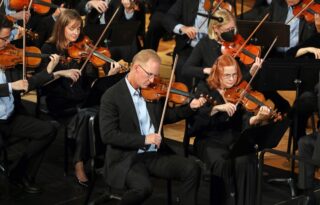
Peter Winograd, first violinist with the American String Quartet and member of the violin and chamber music faculties at the Manhattan School of Music, didn’t always know that he wanted to pursue music.
“I was kind of a normal kid who went to school in West Hartford, wanted to play with my friends and played sports and stuff, but my parents saw that there was some talent in me musically,” he said.
Raised by a professional pianist mother and a father who was founding cellist of the Juilliard Quartet and conductor of the Hartford Symphony in Connecticut, Winograd began learning to perform at young age, despite his initial ambivalence toward the family business.
Since the piano trio is a combination of the violin, cello and piano, his parents decided to have him try out the violin as early as age four, putting into practice the Suzuki method.
According to MasterClass, the Suzuki method describes how “children learn by listening to orchestrated pieces, memorization and rigidly scheduled practices.”
“They just kept saying, ‘Stay with it and maybe when you get older, the spark of music will hit you and you’ll want to do something with it,’” he shared.
That’s exactly what happened in his mid-teens.
“My father began bringing me down to orchestra rehearsals for the Hartford Symphony and it became sort of a fascination for me,” he said.
As he got older, his father would bring home pieces by great violinists, including Itzhak Perlman and Jascha Heifetz, and his enthusiasm soared higher.
“The actual emotion of the music as I matured and I got older, it hit me more and more, and then I realized I wanted to do it,” he said.
Aside from teaching, Winograd serves as concertmaster for The Discovery Orchestra.
Most recently, he served as concertmaster for “Discover Saint-Saëns’ ‘Organ’ Symphony,” which is directed by his longtime friend, George Marriner Maull, and is available to stream on PBS Passport.
“I think sometimes with classical music there’s a bit of a barrier. You know the performers are up on stage and we’re here. We don’t really know much about them and then the music, we don’t know that either. He would break all of that down,” he said.
Winograd said that Maull emphasizes active learning.
“He involves the audience incredibly, it’s like it’s not a passive learning experience. You’re getting out of your chair, you’re clapping, you’re singing. He’s very unselfconscious and he has a way,” Winograd said. “He really tries to recondition people’s attitudes of listening to classical music.”
Winograd added that programs like these are all about emotionally connecting people.
“Music is an abstract art form, opera and popular music with lyrics notwithstanding. If you just listen to a symphony, it’s delving into emotions that you can try to put words to, but sometimes it only cheapens it,” he said. “The abstractness of the music form, the music genre, is a way of getting into emotion, finding the depth of emotion in a different way. It’s always magical to me when I hear a piece and I wonder, ‘Why am I having such a deep reaction to it?’”
When asked if classical music is underrated, Winograd said that the genre faces popularity problem.
Winograd describes classical music as having more “complexity and subtlety” then most contemporary pop songs and advises curious learners to listen to pieces more than once, setting aside 15 minutes a day.
Winograd finds that the need for classical music is much more significant in today’s technologically advanced digital age.
“People are so focused on small sound bites on their phones, quick news, that nobody these days has the patience to go and maybe be affected by something like classical music or read a book. I find myself grabbing my phone and looking at headlines. Reading any publication, there just seems to be so much dire news out there with global warming, political divisions and things like that,” he said. “Going to art in general, it doesn’t even have to be music, is something that can really bring you back to some sort of enjoyment and sanity. Then you realize that your day doesn’t have to just be thinking about all these things that are out there now. There are other ways to occupy your time.”
Winograd also offered advice for those interested in trying out an instrument, especially with Nanuet Public Library’s new music collection, which launched just this summer.
“In terms of playing it’s much more complicated because it’s very difficult to play the violin or to play the piano and so it really does take a lot of time, a lot of practicing,” he said.
Winograd suggests the guitar for starters.
A resident of West Nyack with his wife and two children since 1997, he also hinted that some time in the future, he sees himself possibly launching a new music series in the community.
“It’s been a joy the whole time. We love Nyack, we love the residential quality of West Nyack. The school system was great. Our kids are 22 and 24 now and I think they had a really wonderful upbringing there, so I wish I can do more with music in Rockland County,” he said.

You must be logged in to post a comment Login